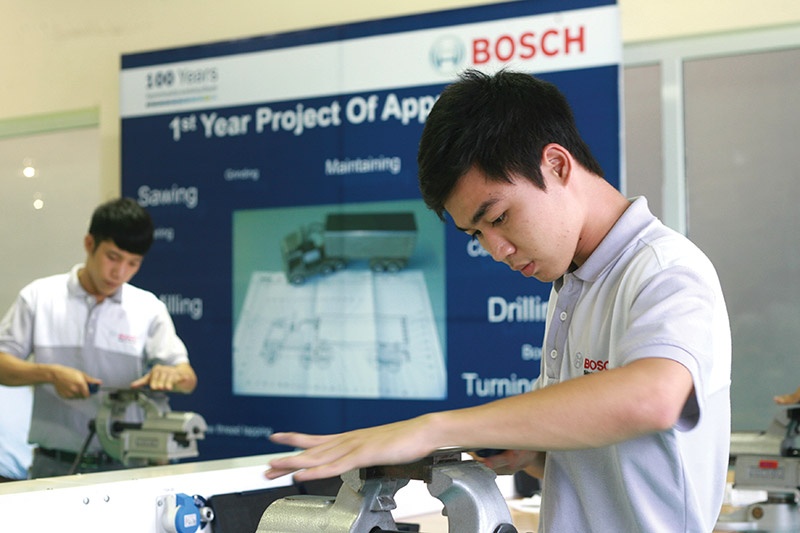Vietnam ramps up ratification of EVIPA
 |
| Many European groups are hoping to enter or expand in Vietnam, and the EVIPA will aid protection, Le Toan |
Since last year, Vietnamese government members have been in constant contact with the 16 EU member states that have yet to adopt the agreement (EVIPA).
In phone talks on July 15 between Minister of Foreign Affairs Bui Thanh Son and his Czech counterpart Jan Lipavsky, the latter noted that the Czech government supports the promotion of ties between Vietnam and the EU. As the rotating president of the EU Council for the second half of 2022, the Czech Republic will hasten EU member countries to soon ratify the EVIPA.
Over the previous couple of months, Minister Son had also talked on the phone with Josep Borrell, Vice President of the European Commission, and Alexander Schallenberg, Austria’s Federal Minister for European and International Affairs, in the hopes of pushing forward full ratification.
In April, Prime Minister Pham Minh Chinh and his Italian counterpart Mario Draghi discussed ways to foster bilateral and multilateral cooperation between Vietnam and Italy, which has included Vietnam on its list of priority countries for trade and investment cooperation in the post-2020 period. The Vietnamese leader called on Italy to soon ratify the EVIPA as one of the best solutions to increase Italian investment in Vietnam.
Pham Hong Hai, deputy director of the Ministry of Foreign Affairs’ (MoFA) Department of European Affairs, told VIR that the ministry is working with other EU member states on this issue, “But it may take a long time for the agreement to come into full implementation due to very slow ratification of EU member states. Such slow ratification means investors would need a long time before their interests can be ensured.”
An expert from the Delegation of the European Union to Vietnam told VIR, “It won’t be easy or quick for many of the remaining EU nations to soon adopt the EVIPA because of internal issues, especially now the Russia-Ukraine conflict is having a bad impact on their economies. It seems that ratification of the EVIPA is not a big priority for these nations now, and instead, they are seeking measures to provide sufficient energy and fuel for their own economies.”
Though signed in 2019 and ratified by the European Parliament and Vietnam’s National Assembly in the following year, the EVIPA is still subject to EU member ratification procedures. To date, the parliaments of 11 EU nations have ratified the deal.
According to the MoFA’s Department of European Affairs, the remaining 16 nations – such as Germany, France, Italy, Belgium, and the Netherlands – have yet to do so because of reasons such as the ongoing efforts being made to deal with the Russia-Ukraine conflict.
Barriers also include complicated procedures within these nations’ parliaments, with some parties not supporting trade liberalisation as they want to protect domestic production.
For example, in Belgium, the agreement must be ratified by the nation’s six states independently. Germany and the Netherlands, meanwhile, already have bilateral investment protection agreements with Vietnam that currently remain valid, making it more complex to approve the EVIPA.
If the EVIPA is fully ratified by all 27 European nations, Vietnam may have a bigger advantage in attracting more high-quality investment from the EU than China. In May, the ratification of the EU-China Comprehensive Agreement on Investment was suspended by the European Parliament (EP) due to geopolitical tensions.
“The EU hopes that its investment protection agreement with Vietnam will boost investment in the country. It is one of Asia’s fastest-growing economies and is also a gateway to the wider East Asia region. Vietnam is therefore a promising market, and relative to the size of its economy, it has attracted a very high rate of foreign investment,” said an EP statement.
According to the EP, the EVIPA will replace the 21 existing bilateral investment agreements between Vietnam and 21 EU member states. These rules will ensure that European investors will receive the best available treatment, without infringing on Vietnam’s right to legislate in its own best interests on issues such as health and safety or the environment.
What the stars mean:
★ Poor ★ ★ Promising ★★★ Good ★★★★ Very good ★★★★★ Exceptional
Related Contents
Latest News
More News
- Kurz Vietnam expands Gia Lai factory (February 27, 2026 | 16:37)
- SK Innovation-led consortium wins $2.3 billion LNG project in Nghe An (February 25, 2026 | 07:56)
- THACO opens $70 million manufacturing complex in Danang (February 25, 2026 | 07:54)
- Phu Quoc International Airport expansion approved to meet rising demand (February 24, 2026 | 10:00)
- Bac Giang International Logistics Centre faces land clearance barrier (February 24, 2026 | 08:00)
- Bright prospects abound in European investment (February 19, 2026 | 20:27)
- Internal strengths attest to commitment to progress (February 19, 2026 | 20:13)
- Vietnam, New Zealand seek level-up in ties (February 19, 2026 | 18:06)
- Untapped potential in relations with Indonesia (February 19, 2026 | 17:56)
- German strengths match Vietnamese aspirations (February 19, 2026 | 17:40)

 Tag:
Tag:




















 Mobile Version
Mobile Version